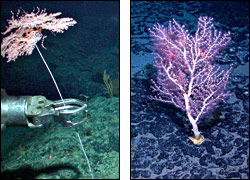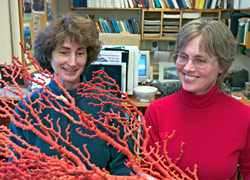 |
 Enlarge
image
Enlarge
image |
| Alvin's
claw extended to sample a coral. |
 Enlarge
image
Enlarge
image |
| Biologists
Lauren Mullineeaux, left, with Susan Mills. (Photo by
Tom Kleindinst, WHOI Graphics Services) |
In near-freezing waters thousands of meters below the ocean
surface, communities of brightly colored corals bloom
on the seafloor, living quiet, long lives far from sunlight and
waves. Like their tropical, shallow-water cousins, these deep-sea corals harbor a rich diversity of underwater life, including
abundant commercially valuable fish.
Scientists only recently discovered these ancient ecosystems. So have fishermen, who have begun to target seamounts—extinct submarine volcanoes whose rocky slopes
and nutrient-rich currents provide the rare combination of foundation and food that deep-sea corals need to grow.
Like old-growth forests, deep-sea coral communities may
persist for hundreds of years and, scientists fear, may be slow
to recover from disruption. Once damaged, they may disappear, along with the rich ecosystems they have sustained over
long reaches of time.
“Conservation concerns have added urgency to our research,”
said Lauren Mullineaux, senior scientist in the Biology Department.
“Closures of many shallow-water fisheries have forced people
to fish deeper, so there is increasing pressure on these habitats.
We’ve seen trawl tracks on them.”
In 2003 Mullineaux and WHOI biologist Susan Mills (bottom
photo) dived in the submersible Alvin and in 2004
used the remotely operated vehicle Hercules. They
took part in an expedition to the New England Seamount Chain
off the U.S. Eastern Seaboard to study where and how long
the corals live, to catalog the richly diverse animal communities
that live with them, and to find out how they reproduce. In
particular, they seek to learn how coral larvae disperse through
the oceans to settle and reseed coral communities, or to create
new colonies. The answer is essential for understanding if
deep-sea coral habitats can endure and recover from the threats
they now face.
The research was supported by the NOAA Office of Ocean
Exploration and the WHOI Ocean Life Institute.
|

